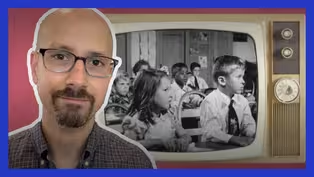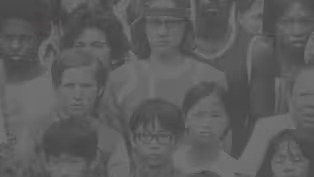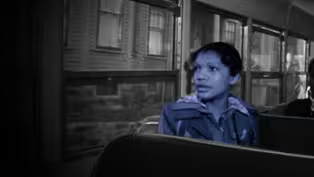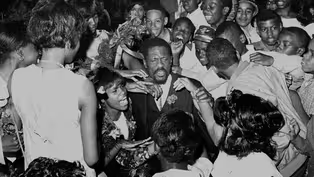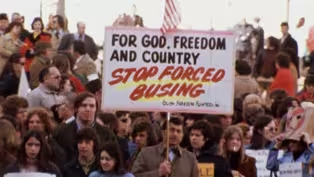
Chapter 1 | The Busing Battleground
Clip: Season 35 Episode 7 | 11m 9sVideo has Closed Captions
Watch a preview of The Busing Battleground.
Watch a preview of The Busing Battleground.
Problems playing video? | Closed Captioning Feedback
Problems playing video? | Closed Captioning Feedback
Corporate sponsorship for American Experience is provided by Liberty Mutual Insurance and Carlisle Companies. Major funding by the Alfred P. Sloan Foundation.

Chapter 1 | The Busing Battleground
Clip: Season 35 Episode 7 | 11m 9sVideo has Closed Captions
Watch a preview of The Busing Battleground.
Problems playing video? | Closed Captioning Feedback
How to Watch American Experience
American Experience is available to stream on pbs.org and the free PBS App, available on iPhone, Apple TV, Android TV, Android smartphones, Amazon Fire TV, Amazon Fire Tablet, Roku, Samsung Smart TV, and Vizio.
Buy Now
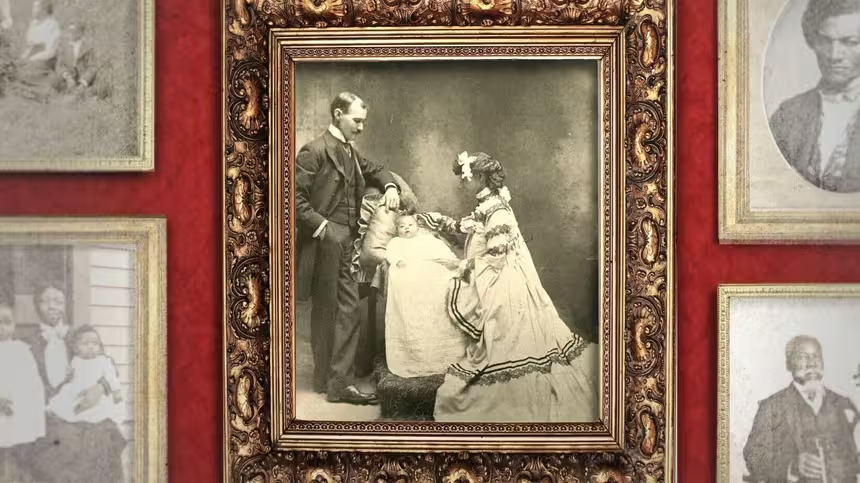
When is a photo an act of resistance?
For families that just decades earlier were torn apart by chattel slavery, being photographed together was proof of their resilience.Providing Support for PBS.org
Learn Moreabout PBS online sponsorship♪ ♪ PHYLLIS ELLISON-FEASTER: The first day of school, my brother and I had our bus assignments, and we collected students and other buses to drive up to South Boston High School.
L Street Annex, right over here-- first two buses, please.
BOB MONAHAN: I went up to Southie High.
There was staging for the television cameras.
And the first one I noticed was the BBC.
We all knew something was going to happen.
LEON ROCK: As the kids were getting out the buses, there was a line of police holding back residents from South Boston screaming at the Black students.
We were fearful for our lives.
RUTH BATSON: We were not pushing for desegregation because of the brotherhood of man concept.
Where there were White students, that's where the money went.
MONAHAN: How adults in Boston could not have come up with a better plan, it still baffles me.
WOMAN: I'm not for this.
I don't care, my one will not go to school.
But it's tearing them apart.
I wouldn't care if they were green or purple.
It's the idea of putting my kid on a bus when I have a school right across the street from where they should go.
JIM VRABEL: White families and even some Black families felt that the decision of where their children should go to school should be up to them.
First of all, busing will never work in this city-- never.
They will not take the rights away from these people.
ROCK: Many Black parents were saying, "This is crazy.
No, we can't send our kids into the lion's den."
WOMAN: I don't want to bus my child to any school.
I want to have a good school in my community where my child can go and get just as much good education as anybody else.
MATTHEW DELMONT: The battle over busing in Boston exposed an important truth, that the majority of White Americans didn't actually support civil rights if it meant they had to actually address racial inequality in their own cities.
The people of Boston elected people to public office who campaigned on deliberately racist platforms.
LOUISE DAY HICKS: If you ask me, "Do you know where I stand?
", you know where I stand.
Shoot all the niggers.
MAN: Why?
Because why should they move over here and wreck this city?
IRA JACKSON: It was the ugliest that I've ever experienced human nature, and the most fraught with danger and concern that we were at the precipice of anarchy, civil war-- a race riot.
It's not a question of whether the Constitution can be enforced.
It's only a question of at what cost.
(people shouting) ♪ ♪ (people talking in background) (shutters clicking) (static crackling) Good evening, my fellow citizens.
BRYANT ROLLINS: On June 11, 1963, President John Kennedy calls for a national press conference and all three networks broadcast it.
It rivets the attention of the country.
The Negro baby born in America today, regardless of the section or the state in which he is born, has about one-half as much chance of completing a high school as a White baby born in the same place on the same day.
I was at home watching him on TV.
And to hear a president of the United States acknowledge the depth of the racial challenges was just remarkable and uplifting.
In the middle of the struggles that are going on in the South, to take a side like that, on our side, it was, like, revolutionary.
There can be no submission to the theory that the central government... ROLLINS: Earlier in the day, Governor George Wallace stood in the schoolhouse door and said, "In my tenure as governor here, Negroes will never attend the University of Alabama."
I am asking from you an unequivocal assurance that you will not bar entry to these students, to Vivian Malone and to James Hood.
ROLLINS: Kennedy finally saw how rigid and devastating the racism in the South had become, that it was no longer possible to stay on the sidelines.
This is not a sectional issue.
Difficulties over segregation and discrimination exist in every city in every state of the Union.
Part of the irony of Kennedy's speech was that in Boston, the NAACP is appearing before the Boston School Committee, in an equally dramatic moment, at the same time.
It was a very hot night, there was no air conditioning.
The windows were wide open in search of air.
PEOPLE (in distance): ♪ We shall overcome ♪ JONES: You could hear, downstairs, demonstrators chanting and singing freedom songs.
Inside the school committee headquarters, Ruth Batson presented her case to the all-White school committee.
FARAH STOCKMAN: Ruth Batson really is on a mission to get the Boston School Committee to admit that there was de facto segregation in the schools and to do something about it.
JONES: Louise Day Hicks, South Boston lawyer, chairperson of the school committee, said to Mrs. Batson, "Mrs. Batson, we don't segregate the schools.
"We only assign students to schools closest "to where they live, so we're not accepting this notion "and we are not going to do anything about what you're talking about."
We made our presentation, and everything broke loose.
We were completely rejected that night, and we left battle-scarred.
If an American, because his skin is dark, cannot eat lunch in a restaurant open to the public, if he cannot send his children to the best public school available, if he cannot vote, who among us would then be content with the counsels of patience and delay?
So here you've got President Kennedy making an impassioned speech to the nation, in this morally rich position that he's taking, juxtaposed with the Boston School Committee, which is presented with this opportunity, and it does exactly the opposite: dug its heels in.
JONES: This meeting is a turning point.
It ignited a movement.
The Civil Rights Movement came to Boston on June 11, 1963.
(crowd singing) ♪ ♪ VRABEL: In the 1960s, Boston was a rundown has-been of a city.
The middle class was on its way out.
It was left as a place for the poor and working class.
It was a city of Waldorf and Hayes-Bickford cafeterias, and bookie joints, and newspapers blowing down the streets.
BILL JOY: Boston is sort of like the palm of your hand.
You have the little peninsulas going out into the harbor, whether it's Dorchester, South Boston, East Boston, North End, Charlestown.
They go out into the harbor.
And the Downtown area is sort of the back of your hand.
So, you don't go through the neighborhoods.
The neighborhoods are their own little sort of worlds.
ROLLINS: East Boston was the Italian neighborhood.
Mattapan was the Jewish neighborhood.
South Boston was the Irish neighborhood.
The South End was Hispanic, by and large.
Right adjacent to the Downtown Boston was the Chinese community.
♪ ♪ Roxbury-- Lower Roxbury and Upper Roxbury-- were the Black communities: African Americans who had been there for some 200 years, and Caribbean Americans who came in the 1900s.
STOCKMAN: Ten years earlier, Boston had been a very White city.
In the 1950s, you're seeing people come up from the Deep South.
They're crowding into these neighborhoods where Blacks are allowed to live-- the South End and Roxbury.
They can't move out because of racial covenants written into the deeds.
And outside of those Black neighborhoods, they faced tremendous discrimination.
ROLLINS: The conditions were pretty bad, and they were deteriorating as more folks moved in.
JONES: Boston was like up South.
There were patterns of racial discrimination everywhere.
Black folks were invisible.
It was like they didn't live in the city.
People from South Boston didn't come into Roxbury.
People from Roxbury didn't go into South Boston.
(crowd cheering, drums pounding) AL HOLLAND: We used to try to go to the St. Patrick Day parade.
Once we got to the South Boston side, we realized that, "Hey, we'd better get out of here," because people started yelling at us, calling us all kinds of names.
Then people started chasing us.
JOE BURNIEIKA: The only time I ever saw a Black person when I was growing up was when the Black Jehovah Witnesses would come down the street.
My grandmother, who was from County Cork in Ireland... (laughs): When she would see them coming down, she would say, "Close the blinds, don't answer the door!"
And I could never understand what she was so upset about.
But that was the environment that I grew up in.
Clip: S35 Ep7 | 4m 47s | Brown v. Board of Education Didn't End Segregation. (4m 47s)
The Battle for Bilingual Education
Clip: S35 Ep7 | 4m 41s | How Asian and Latino activists took on the education system in Boston and won. (4m 41s)
The Busing Battleground: Who's Who
Clip: S35 Ep7 | 59s | In September 1974, Boston schools prepared to integrate via a court-mandated busing plan. (59s)
Clip: S35 Ep7 | 2m 18s | Bill Russell addressed the thousands of students gathered for the Freedom Stay-Out. (2m 18s)
Trailer | The Busing Battleground
Video has Closed Captions
Preview: S35 Ep7 | 1m 53s | Revisit 1970s Boston, when court-mandated school integration unleashed racial unrest. (1m 53s)
Providing Support for PBS.org
Learn Moreabout PBS online sponsorshipSupport for PBS provided by:
Corporate sponsorship for American Experience is provided by Liberty Mutual Insurance and Carlisle Companies. Major funding by the Alfred P. Sloan Foundation.


